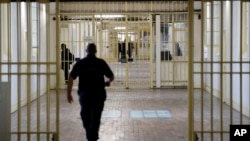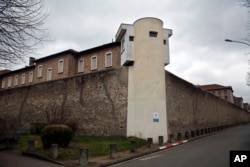If there were ever a time for France to seriously tackle Islamic radicalism in its overpopulated, understaffed and underfunded prisons, it would be now.
Radicals in the general prison population can quickly start influencing other inmates and endanger prison staff. The problem that has dogged French authorities for years is set to grow more acute as foreign fighters and whole families return to France amid the collapse of the Islamic State group. More citizens from France have traveled to the battlefields of Syria and Iraq than from any other European country.
Now, the United States is urging allied nations to claim their nationals held by the U.S.-backed Syrian Democratic Forces because facilities there are filling up. But France has closed the gate.
“They are French but they are our enemy,” Foreign Minister Jean-Yves Le Drian said this month, although adding that young children would be brought home.
The truth is that making room for more returnees in French prisons, some built in the 19th century, could put new strains on the prison system - and be a tight squeeze. By December 2017, some prisons were over capacity by 220 percent, according to the Justice Ministry. It’s not uncommon for numerous inmates to share a cell meant for one.
Already there are 500 people convicted or awaiting trial for terrorism in French prisons, and 1,150 under watch for varying degrees of radicalization or potential radicalization - about 130 of them returnees from the war zone. It is a population that prison staff have felt underequipped and insufficiently trained to handle.
Guards went on an unprecedented 10-day strike last month after an attack by a radicalized inmate, prompting President Emmanuel Macron to demand a “global penitentiary plan” by the end of February to “profoundly modify” an antiquated system - notably with less reliance on prison terms as punishment to ease overcrowding.
But the issue of how best to identify radicals and hold them without danger to guards or to other prisoners remains.
Late start
France got a late start - just three years ago - in its search to prevent or contain prison radicalization in its 188 prisons, even though the country has been subjected to Islamic terrorism since the 1990s. Prisons are now known as breeding grounds for radicalization, and men radicalized in prison have perpetrated multiple attacks in France.
“It’s a kind of paradoxical situation: the highest number [of jihadis] and the fewest attempts to take this problem seriously,” said Farhad Khosrokhavar, a leading expert on prison radicalization. “Then it keeps on going because there is no serious program of deradicalization.”
He said the radicalization rate is lower in Britain and Germany, countries that have long had programs outside prison that emphasize community outreach. France’s seat-of-the-pants deradicalization programs, started in 2014, have foundered, and the only state effort - based on volunteer participation - was scrapped last year for lack of clients.
France is now trying to catch up. Prime Minister Edouard Philippe is to announce a new plan on Friday, with some measures addressing prisons.
The January 2015 attacks at the satirical newspaper Charlie Hebdo and on a Paris kosher grocery store put the nation’s prison system on notice. At least one of the three French attackers was radicalized in prison.
Its first short-lived effort to address prison radicalization ended when an inmate serving time for trying to go to Syria plunged a homemade weapon into the back of a guard. A new system was set up by which inmates suspected of radicalization are evaluated over a four-month period. The guards’ protests pushed the Justice Ministry into doubling the number of yearly evaluations to 250 and increasing the number of places to quarantine dangerously radicalized inmates to 1,500.
Tricking the system
But experts warn that the evaluation programs are not enough, and inmates learn tricks to defeat the system.
“They know they’re being observed so for four months they can adapt to questions,” get a good evaluation - and be dispatched to the general prison population, said Ouisa Kies, a sociologist who spent 10 years visiting prisons.
A prosecutor specialized in anti-terrorism cases echoed that assessment.
“They have refined their strategy ... and have adapted perfectly to the methods of evaluation,” Naima Rudloff, said in a recent interview with the newspaper Le Figaro. “They have learned how to groom their profile.”
Within the general prison population, radicals are often propelled to the top of the hierarchy and can exert an uncanny influence over other inmates, offering the lure of belonging to a group, protection for the especially vulnerable or pocket money for inmates without funds, Kies said.
For Daniel Koehler, a German specialist who designs programs for prison authorities and consults on a risk assessment program in the United States, a prison program “falls or stands with the level of staff training” - from prison staff to psychologists and probation staff.
Britain is making it standard procedure to train all prison guards in dealing with and spotting radicalization as part of a 2016 overhaul to cope with extremists. Other measures include holding the most dangerous extremists in three “separation centers” - as in France - and creating a special unit advising on specific threats.
But no European country is fully prepared to take on returnees, Koehler contends, saying special programs are needed.
“For those who committed or have seen horrendous acts of violence, their experience goes far beyond the programs here in Germany or in other western European countries,” he said.






